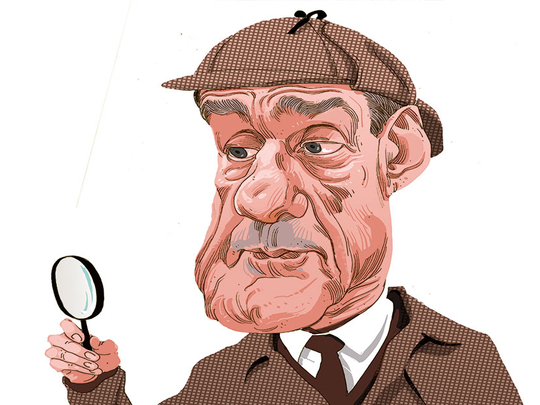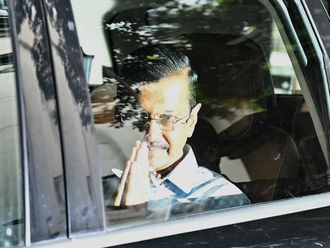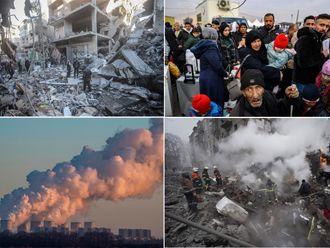
US Deputy Attorney General Rod J. Rosenstein looked practically giddy at the podium on Friday when he announced a massive indictment of 13 Russians in connection with a plot out of a spy novel to manipulate the 2016 election results. And why shouldn’t he be pleased? The indictment reflects painstaking investigatory work, laying bare a complex, well-funded and deliberate scheme to interfere with our democracy.
Rosenstein was able to explain in excruciating detail some of the evidence that would support the intelligence chiefs’ certain conclusion that Russia meddled in our election. Sure, the FBI, the CIA, the National Security Agency and the rest of the intelligence community kept telling us this was the case; Rosenstein described allegations that show one part of how it was done. It doesn’t rely on the credibility of former FBI director James Comey or on the mainstream media or on Stephen Bannon. The FBI and the Justice Department have the goods, because they have a thousand details that so far have been hidden from view.
This should underscore several key developments.
First, Republicans’ clumsy efforts to attack the Foreign Intelligence Surveillance Act (Fisa) warrant for Carter Page or to smear Comey don’t matter. House Intelligence Chairman Devin Nunes’, Republican-California, plots and antics and concocted memo are irrelevant. The investigation, at least a good deal of it, rests on facts that are unknown to the House Republicans and are beyond dispute.
No Republican is going to stand up to say the indictment is a “hoax” or the allegations against these 13 Russians are “fake.” We’ve argued for some time that their antics do not matter, in the end, because special counsel Robert Mueller III has the facts. This is the first real confirmation that our faith in the investigative powers of Mueller and his team was not misplaced.
Indeed, Republicans look precisely like the “unwitting” operatives in the indictment who reportedly lent assistance to the Russian operatives. Republicans’ efforts to distract and distort the growing body of evidence make them unwitting (we hope) pawns in the Russians’ efforts to deny their role. (If House Speaker Paul Ryan has any political survival skills, now would be a good time for him to yank Nunes off the Intelligence Committee.) And incidentally, Democrats might want to forget about their counter-memo now that the GOP and Nunes have been utterly discredited. They don’t need to stab a corpse.
Second, Trump obviously has known for more than a year, if not the particulars, at least the substantive conclusion of our intelligence community. And yet he pretended as though there was no basis for the investigation. There was no Russia scandal, he insisted. On Friday he was reduced to claiming that the plot began before his presidential announcement (who cares?) and that he had been cleared of collusion (patently false).
Not only have his denials been thoroughly debunked, but his denials can now be seen as directly contrary to the facts he was being told, over and over again. Was he delusional? Or was he simply lying over and over again about the incontrovertible evidence of Russian interference?
Third, the indictment makes a finding of collusion more likely. You cannot collude if there is no one to collude with; now we know there was. The Lawfare blog explains:
“The fact that this indictment doesn’t allege misconduct on the American side does not necessarily mean that Mueller lacks evidence to support such an allegation — or that he will not develop it in the future. This indictment deals with a limited subject matter: one aspect of the Russian operation-that involving social media influence measures — undertaken by non-governmental actors. It makes a point of not addressing the conduct of US actors. That is neither inculpatory or vindicating. It is, rather, a deferral of the matter to another day.
“What this indictment does, rather, is establish part of the predicate for a later claim of collusion. That is, the indictment details part of what it was that any Americans might have been colluding with.” Fourth, we are reminded that we already know of collusion — or put it this way, collaboration between the Russians and the Trump campaign, both in the social media space and elsewhere:
— We know of the June 9, 2016, meeting organised after a Russian offered dirt on Hillary Clinton and Donald Trump Jr. enthusiastically accepted.
— We know George Papadopoulos made multiple contacts looking for a meeting with and/or dirt from the Russians. (The Moscow Project tells us: “George Papadopoulos met for the first of at least three times with Joseph Mifsud, a Maltese professor and reported Russian intelligence asset, on March 14, 2016.” He kept senior campaign officials apprised of the efforts to reach out to Russia.)
— We know he was not alone. Again, from themoscowproject.org: “By the end of June, at least eight individuals involved with the Trump campaign - George Papadopoulos, Jeff Sessions, Michael Cohen, Jared Kushner, Paul Manafort, Donald Trump Jr., Michael Flynn, and Rick Dearborn — reportedly had contacts or meetings with at least 13 Kremlin-linked individuals — Josef Mifsud, the ‘Female Russian National,’ Sergei Kislyak, Felix Sater, Michael Cohen, Rob Goldstone, Natalia Veselnitskaya, Rinat Akhmetshin, Irakly Kaveladze, Konstantin Kilimnik, Aleksander Torshin, Vladimir Putin, the individual who emailed Rick Dearborn, and potentially Oleg Deripaska.”
— We know Carter Page during the campaign went to Russia in July 2016 to deliver a speech.
— We know the Trump team members retweeted Russian bots, helping to spread their anti-Clinton messages and divisive themes.
— We know WikiLeaks released “a steady stream of emails stolen from Democratic and Clinton campaign operatives. Trump eagerly embraced WikiLeaks during the campaign, publicly mentioning the website 164 times in the final month of the campaign alone” (the moscowproject.org).
— We know the remarkable events of October 7, 2016: “That afternoon, at 4.03pm, The Washington Post published the explosive ‘Access Hollywood’ tape, behind-the-scenes footage from 2005 in which Trump bragged about groping women without their consent. Just 29 minutes later, WikiLeaks began publishing the contents of Podesta’s email inbox. Whether there was explicit coordination between the Trump campaign and WikiLeaks remains unknown” (the moscowproject.org).
The question is no longer whether there a Russian plot to interfere with the US election or whether there was a high degree of synchronisation between the Trump campaign and the Russian campaign for Trump. We now have to learn how extensive was the interplay and how cognizant of foreign influence were Trump and members of his team.
Likewise, we no longer have to wonder why Trump tried to get the FBI to lay off former national security adviser Michael Flynn or why he fired Comey or why he smeared the FBI or why he helped draft a misleading statement to explain the June 2016 meeting. In short, there is a clear motive to interfere with and obstruct the Russia investigation. The motive to obstruct is obvious: Trump did not want investigators to find and be able to present credible evidence of a Russian plot.
That failed on Friday. Nunes and screaming “hoax” won’t save him. We will find out soon enough whether all of this amounts to knowing, criminal wrongdoing by the president, his family and/or his most senior advisers.
As to Trump’s fidelity to the Constitution and violation of his oath, we don’t need to ask whether the president has ignored an ongoing threat to the United States from continued Russian meddling or whether he is indifferent to that threat. Both are indisputably true. We saw on Friday that when the extent of the alleged Russian plot to interfere with the election (which he has been repeatedly briefed on but taken no action to thwart) came to light, he reacted not with any determination to stop the ongoing Russian assault but with a false claim of vindication. He makes the case better than anyone that he is abjectly unfit to serve as president.
— Washington Post.



_resources1_16a45059ca3_small.jpg)






